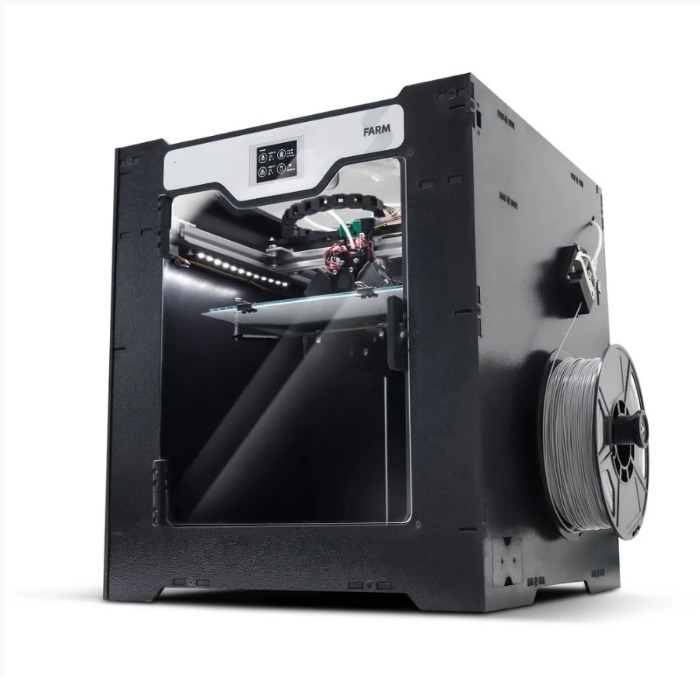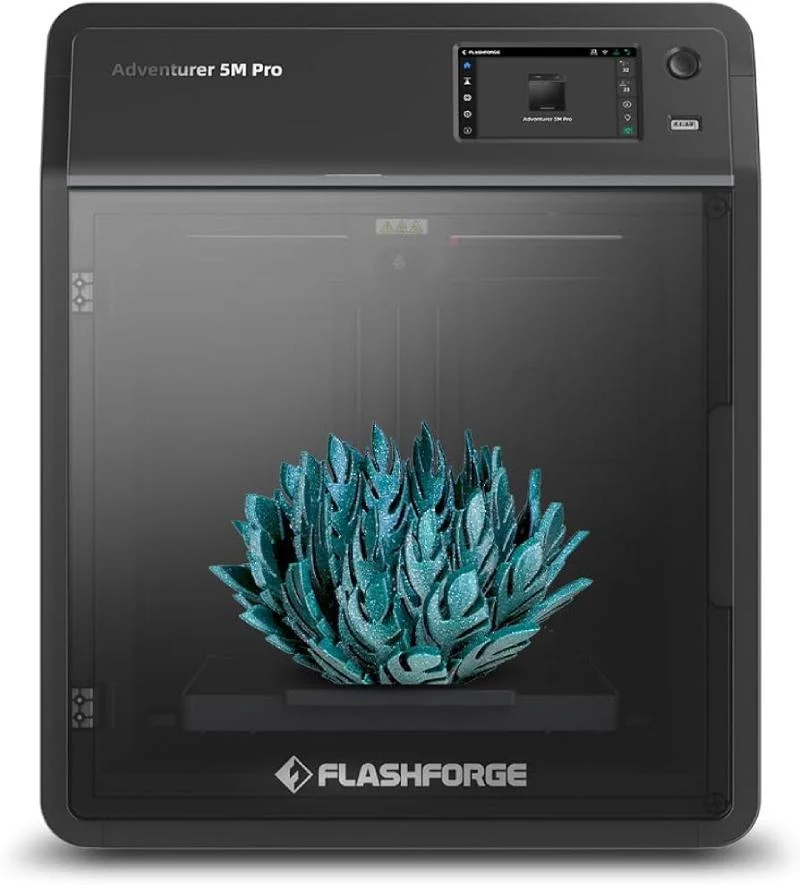Compare FARM vs Adventurer 5M PRO
Comparison between the best 3D printers
Choose the best 3D printer at the best price. The cheapest 3D printers are here.
Buy a 3D printer here with 3D Fila.
 |
 |
|
| Model | FARM |
Adventurer 5M PRO |
| Printing Material | Filament | Filament |
| Buy Filament for Sethi 3D FARM | Buy Filament forFlashforge Adventurer 5M PRO | |
| Estimated price | $1127,00 | $599,00 |
| Manufacturer | Sethi 3D | Flashforge |
| Release Year | 2021 | 2023 |
| Print Volume [mm] | 240x240x240 | 220x220x220 |
| Printer Size [mm] | 550x42x500 | 380x400x453 |
| Weight [kg] | 15,7 | 10,8 |
| Power Loss Recovery | YES | YES |
| Enclosed printer | YES | YES |
| Bed Leveling | Automatic | Automatic |
| Filament End Sensor | YES | YES |
| Bed type | Heated | Heated |
| Power supply system | Bowden | Direct Drive |
| Standard nozzle | 0,4 | 0,4 |
| Maximum Nozzle Temperature [°C] | 270 | 280 |
| Maximum Bed Temperature [°C] | 120 | 110 |
| Maximum printing speed [mm/s] | 80 | 600 |
| Filament holder | YES | YES |
| Camera for supervision | NO | NO |
| Recommended filaments | PLA, PETG, Tritan, Flex, ABS | PLA, PETG, TPU, PLA-CF, PETG-CF |
| Recommended slicers | Cura, Simplify, Slic3r | FlashPrint 5 |
| Maximum Resolution [mm] | 0,1 | |
| Processor | ||
| Display | Touchscreen TFT | Touchscreen 4,3'' |
| Power Supply | 450 W | 350 W |
| Connectivity | USB | Wifi / Ethernet / USB |
| Operating systems | Windows, Mac, Linux | Windows, Linux, Macbook |
| Date of registration in the system | 2022-10-11 | 2024-07-09 |
| Release date | 2021 | 2023 |
| Extra features | Sethis Farm printer offers a generous 240 x 240 x 240 mm print area, ideal for large projects. Its intuitive touchscreen display makes it easy to operate, while the intelligent sensor prevents problems by detecting filament shortages or jams. Its power recovery feature allows you to resume printing after interruptions. It stands out for its 9-point optical auto-leveling and high-performance heated bed, ensuring accuracy and versatility on different materials. Its 32-bit electronics and silent drivers promote a smooth and efficient experience. In addition, the Farm has a closed cabinet, expanding the range of usable polymers, and a turbo cooling system to speed up the process between prints. The machine also offers practicality with a storage drawer and simplified software updates. | The Flashforge Adventurer 5M PRO features advanced features such as a CoreXY motion system, direct drive extruder, print speeds of up to 600mm/s and maximum acceleration of 20,000mm/s². It features fast nozzle changes, automatic calibration, active vibration compensation, camera monitoring, time-lapse video, HEPA and carbon filters for particles and VOCs, and an intuitive 4.3-inch touchscreen interface. Ideal for printing materials such as PLA, PETG, ABS and TPU. |
| Support for multiple colors and materials (AMS and CFS) | NO | NO |
Notes * |
||
| Cost-benefit | 6 / 10 | 7 / 10 |
| Hardware | 2.5 / 10 | 3.5 / 10 |
| Tela | . | . |
| Print volume | 3 / 10 | 3 / 10 |
| Performance | 0 / 10 | 5 / 10 |
Conclusion |
| In conclusion, the comparison between the Sethi 3D FARM and the Flashforge Adventurer 5M PRO highlights the distinct advantages and disadvantages of each printer, particularly in terms of features, performance, and value for money. The Sethi 3D FARM, while offering a larger print volume and robust build quality, falls short in terms of performance, with a relatively lower maximum printing speed and less advanced features compared to its competitor. It does excel in versatility with its extensive material compatibility and user-friendly touchscreen interface, making it suitable for users who prioritize build size and material options. On the other hand, the Flashforge Adventurer 5M PRO stands out as a high-performance machine, boasting rapid printing speeds and advanced features such as direct drive extrusion and active vibration compensation. Its lower price point and superior performance metrics suggest a better cost-benefit ratio, making it an attractive option for users seeking speed and efficiency in their printing projects. While the Sethi 3D FARM may appeal to those focused on larger builds and material diversity, the Flashforge Adventurer 5M PRO represents a compelling choice for those looking for performance, advanced technology, and overall value. Ultimately, the decision between the two will depend on specific user needs, priorities, and budget considerations. |

